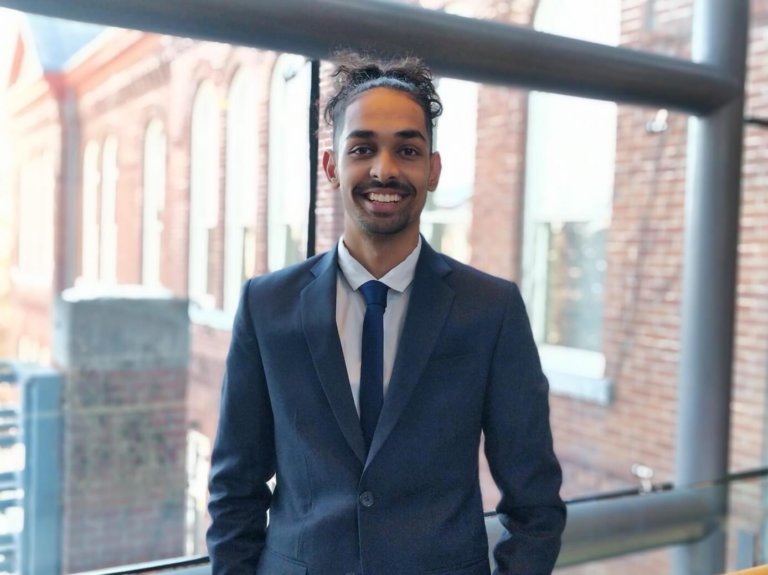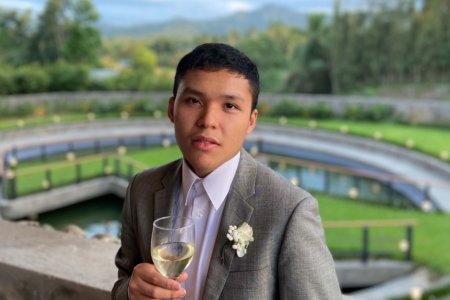
Aryamaan Ghosal, 20, chose Canada for its people. He had applied to business schools in Singapore, the UK and the US. In the end, he picked the Smith School of Business at Queen’s University.
“You always hear Canadians are very open-minded, welcoming and polite — it’s true,” he shares. “My experience thus far has been very impactful and changing. I couldn’t be happier with the decision I made.”
We caught up with Ghosal to learn more about his experience with Smith School of Business, how Canadian foods compare with Nigerian food and his budgeting tips for those who plan to follow in his footsteps:
Why choose to study at Smith School of Business in Canada?
There were two reasons: one, to seek better higher education and two, I wanted to discover myself in a new environment. Studying abroad is a huge milestone for international students when they leave home miles away to establish themselves and excel.
Being in boarding school for about three years in Nigeria prepared me to live by myself and I knew I was ready to step out there and adapt to a new culture, surrounding, challenges, and other hurdles of life.
I’d applied to a wide range of unis and countries that included: Canada, Singapore, the UK and the US. Canada stood out to me because of its people.
You always hear Canadians are very open-minded, welcoming and polite — it’s true. My experience thus far has been very impactful and changing. I couldn’t be happier with the decision I made.

Ghosal has a multitude of restaurants to pick and choose from. Source: Aryamaan Ghosal
What do you like most about Canada?
There are many things to like but the one thing that I particularly like is the fact that there are many opportunities for all students to get involved in extracurricular activities and part-time jobs. In Canada, there are an array of jobs and activities so you get the chance to find something to do that makes you happy.
In my second year, I had the chance to run for Class President at Smith School of Business. It was my first ever campaign and election-based leadership experience — something I thoroughly enjoyed.
By the end of my tenure, I realised my passion for leadership and implemented positive change. Therefore, I ran another election to represent the whole undergraduate commerce programme with 1,975 students on the Smith Faculty Board. I’m excited to see what this role holds for me.
What are some memorable non-academic experiences in Canada you can share?
Exploring the diverse range of restaurants. Kingston, Ontario has the highest number of restaurants per capita in Canada. Every two weeks, I used to try a meal from a different restaurant and it was a lot of fun.
I also enjoy scenic evening walks along Lake Ontario. The sunsets are one of the most breathtaking views in Canada.
What cultural sites have you explored?
Due to the pandemic, I haven’t had the chance to explore as much but there are two locations that stood out to me the most. One is Fort Henry in Kingston because of its amazing views of the whole city and the deep history surrounding it.

“I also enjoy scenic evening walks along Lake Ontario. The sunsets are one of the most breathtaking views in Canada,” Ghosal says. Source: Aryamaan Ghosal
It’s very underrated but many older citizens visit this place and the quaint little shops inside. They also carry out a traditional cannon shooting daily for the tourists and it’s very unique.
The second one is Montreal. I had the chance to visit with some of my friends. It’s a bilingual city in Quebec and the city boasts its iconic foods. My favourite was “poutine” (french fries with cheese curds and gravy).
Is it hard for a foreigner to order food or strike up a conversation with locals?
Not at all! For food, there is a wide range of choices of delivery services such as DoorDash and UberEATS. Although I find the delivery charges unreasonable, it’s the best alternative when you do not want to cook or go out. As for talking with the locals, they are friendly and polite. People are willing to help you out if you have any confusion about finding a place or an address.
While I was buying groceries at the campus store, I was looking at the range of maple syrup brands on the shelves and a local came up to me to recommend something. These little experiences made my experience very special.
What’s the local food like compared to home?
Definitely different. In Nigeria, most dishes are staple foods, rich in spice and natural ingredients. In Canada, you have lots of options to choose from with regards to how much spice you prefer or how many calories you want and so forth.
Do you have any advice for prospective international students?
Be open-minded, this applies to everything. Making friends, eating foods, extracurricular activities and much more. This helped me realise where my passion and strengths intersected and where I could put more work in.
Don’t be scared to reach out to older students. In my first, I made an effort to speak with as many upper-year students as I could. They have been in your shoes and can give you great advice.
Use all resources available. Make sure you exhaust them and don’t be shy to do so. It’s all included in your tuition!
What tips do you have for international students to budget their finances wisely?
Save every month. As little as it may be, set aside money every month and keep it growing for future investments.
Know your needs versus your wants. We all want to buy tons of things but how many of those do we really need? This doesn’t mean don’t spend at all but let your spending be rewarding. I always treat myself with a good meal to celebrate the little wins.
What can you get with 100 Canadian dollars in a month?
It’s really subjective and very dependent on one’s needs. Although the cost of living is slightly expensive in Canada, with CA$100, you can stock up your groceries for two to three weeks.
Lastly, give us three fun facts about yourself:
I am very adventurous. I once walked on the seabed underwater with sharks and manta rays. Next on my list is skydiving.
I speak five languages. Having lived in many countries, I’ve been able to pick up English, French, Hindi, Bengali and Pidgins.
I’m watching “Suits” on Netflix right now. I absolutely love the show to a point where I can tell what a character on it is about to say. I’m open to new recommendations though!










